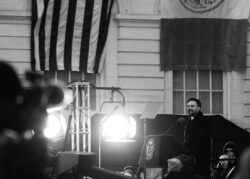Georgetown University has a secret court system on campus that adjudicates crimes as serious as rape and murder. While they describe it as an “educational system” that doesn’t function as a substitute for a court of law, the reality is that it does.
For some crime victims, like rape victim Kate Dieringer, who spoke out in the Voice (“The girl who whimpered rape,” Oct. 24, 2002), and David Shick, who was killed during an alcohol-fueled brawl on campus in 2000, the Office of Student Conduct will be their only day their attackers see in court. The harshest penalty the office can dispense is expulsion, but nobody knows if this was the result in even these most serious cases.
In justifying this secrecy, Georgetown University cites the Family Educational Rights and Privacy Act, a federal law that guarantees confidentiality for student records at any school that gets federal money. While the law can be interpreted broadly to apply to nearly every imaginable record, Congress feels that it should not apply to certain types of campus court records.
In 1998 Rep. Mark Foley (R-Fla.) secured an amendment to FERPA that stripped confidentiality from the final results of campus court proceedings where a student accused of a crime of violence, including acquaintance rape, was found in violation of school rules with respect to such crime. The school can freely disclose the results to anybody; nothing in the law stops it.
Yet Georgetown University continues to hide behind FERPA. Other students don’t know if unrepentant murderers and rapists walk freely among them, potentially putting their own safety at risk.
What is even worse is that Georgetown refuses to allow victims to disclose the results of these proceedings, revictimizing them. If a rape victim tells her best friend that her rapist is back on campus after a suspension, she can be subject to disciplinary action herself. Nothing in any law requires this, yet Georgetown insists on keeping victims silent.
The result is a system where victims are intimidated from speaking out about possible problems with the system, where potentially violent students are allowed to remain on campus unchecked by any authority and where Georgetown’s image is protected.
While Georgetown is hardly alone in doing these things, some schools are starting to change their views. The College of William and Mary recently allowed a rape victim to display a poster identifying her rapist and stating that he would be allowed back on campus. Initially they had removed it, but when confronted with the Foley Amendment, they allowed it back up.
Dealing with campus rape isn’t easy. Keeping it silent only makes it more difficult. Georgetown should let victims speak out, and make it clear that sexual assault and other violent crimes won’t be tolerated.
S. Daniel Carter
Senior Vice President, Security On Campus, Inc.




